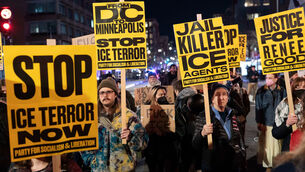Debate and division in the modern world

Presidential hopeful Maria Steen speaking outside Leinster House last week as she tried to secure sufficient votes to run for President of Ireland. Picture: Sam Boal/Collins Photos
The killing last week of Charlie Kirk, a US right-wing activist and close ally of Donald Trump, revealed so much of the worst of where discourse is at these days.
His supporters, far less likely to speak out on atrocities such as Gaza that might not align with their narrow view of right and wrong, quickly jumped to condemn ‘the left’ for his murder before any of the facts surrounding the killer were known. President Trump led this charge.
Facts don’t seem to matter nowadays as so many people make up their own minds immediately, independent of the evidence we once sought as an essential before rushing to judgment.
On the other hand, the glee expressed by many of those who could be termed politically on the left was shocking. It shows where discourse is at that the first thought after a killing nowadays is not sadness at the loss of life, but working out in a very loose sense whose side the murder victim was on and acting accordingly.
So the left are gleeful about the killing of someone they felt represented the worst excesses of right-wing thinking while the right are in mourning but have repeatedly expressed similar glee, or at least, a lack of similar compassion, when people who, politically, don’t align with their view of the world are killed. Even if it is innocent children in Gaza, because they are pro-Israeli.
Fundamentally, a wife has lost her husband, and two young kids have lost their father. Everything beyond that is secondary.
Democrat Governor of California Gavin Newsom, who would be an opponent of Kirk’s political views, showed how such an awful killing should be viewed: “The attack on Charlie Kirk is disgusting, vile, and reprehensible. In the United States of America, we must reject political violence in EVERY form,” he wrote n X.
Unfortunately, the world we live in has seen so many people’s views exist in echo chambers where they only hear those of similar views and anyone with a conflicting view is the representation of evil. Outrage and grief are very selective and very pointed.
The demonisation of those with contrary views is evident in Ireland too when we look at recent referenda and speaks to a wider problem.
I would consider myself liberal and greatly welcomed the passing of the repeal of the Eighth Amendment and the Marriage Equality referenda. But I despair at the condemnation of a large chunk of our population who voted in the other direction. They were insulted about their sincerely held views by many people who live in what might be termed a left-wing echo chamber.
They were accused of being homophobic and misogynistic. And, naturally enough, plenty of these people exist in any society. However, I know of and have spoken to plenty of very decent, sincere people who have a very different view from the modern orthodoxy on such matters.
I thought of all of this last week after Mayo County Council decided not to nominate any prospective presidential candidate seeking their support and after reading a superb article by Fintan O’Toole in .
The political orthodoxy in Ireland has weighed four-square behind the various liberal referenda in the past decade. Fine Gael and Fianna Fáil largely allowed free votes for both (Fine Gael told their ministers in 2018 they must support repeal, while backbenchers were free to vote as they wished). Sinn Féin mandated their TDs to vote for both referenda.
Subsequent to both referenda being passed, all three parties have fully supported them and there appears to be no dissent from this.
It is arguable that any such dissent would damage someone’s career in their party. Therefore, there is a sense that a considerable chunk of the Irish population who voted no for Repeal and the Marriage Referenda have been ostracised not only politically in the Dáil but in public discourse.
A total of 734,000 people voted against marriage equality in 2015 and a broadly similar number, 724,000, voted against repealing of the Eighth Amendment in 2018. The crossover of people who would have voted No in both is likely to be quite large.
Both referenda were substantially carried (over 60% for both) but they were incredibly emotive debates and, unfortunately, often lacked respect for opposing views, on both sides.
When you look at the makeup of the current Dáil, there are very few TDs who speak for those who voted No in those referenda.
The presidential election beckons, and thus far, it has been far from inspiring. Prospective independent candidates are doing a tour of local authorities seeking support. To get on the ballot, a candidate needs either four local authorities or 20 TDs and/or senators to support their bid.
It is a necessary requirement in my view to stop all sorts of cranks and scoundrels making it to the ballot paper. Some of those approaching councils are clearly time wasters who performed poorly in local elections or didn’t bother running there at all.
Of those still seeking nominations, Gareth Sheridan and Maria Steen look, by some distance, the most capable.
Steen is particularly interesting because, as a conservative Catholic, she speaks for many of those who feel disenfranchised not by the outcome of recent referenda – the results were fair and square – but by the ostracisation of them during debates and subsequently. Her name went to a vote before Mayo County Council last week after she was nominated and seconded. However, only five councillors voted for her with 19 voting against.
The Fine Gael and Fianna Fáil councillors in Mayo, likely mandated from up on high, voted against Steen. On one level, it is to be expected. They want their respective candidate to win and why allow a rival into the field? That is a pragmatic outlook. But maybe they should be careful what they wish for. Making a large swathe of the electorate feel disenfranchised is not a good, long-term political strategy.
Respectful disagreement has become more and more difficult in recent years when you have a president of the USA who regularly personally insults opponents and people on both sides of the left-right political divide who trade in similar insults, seeing themselves as the epitome of goodness and opponents as evil. It transcends so many discussions, from war to matters of conscience.
Maria Steen is not someone I think I would vote for but, as Fintan O’Toole said, she performed a vital democratic function in recent referenda by being an able, articulate and patently sincere advocate for the conservative side.
“Those of us who are secular liberals have always stood against the silencing of minorities and we should do so now. The political system has a duty to let a variety of voices be heard in this contest – not least because when social conservatives lose the election they will have reason to consent to its outcome,” said O’Toole.
He was speaking specifically about Steen, but also making a general point that has never been more relevant than the turmoil-filled world we live in right now.





